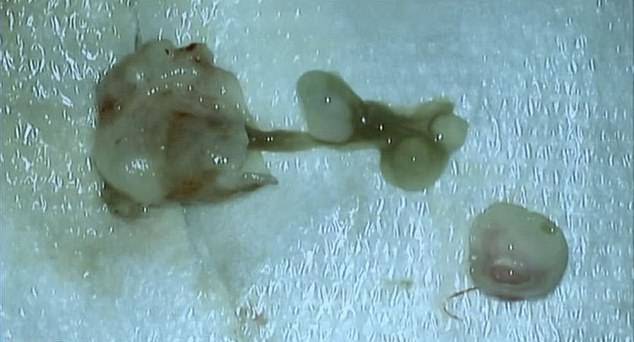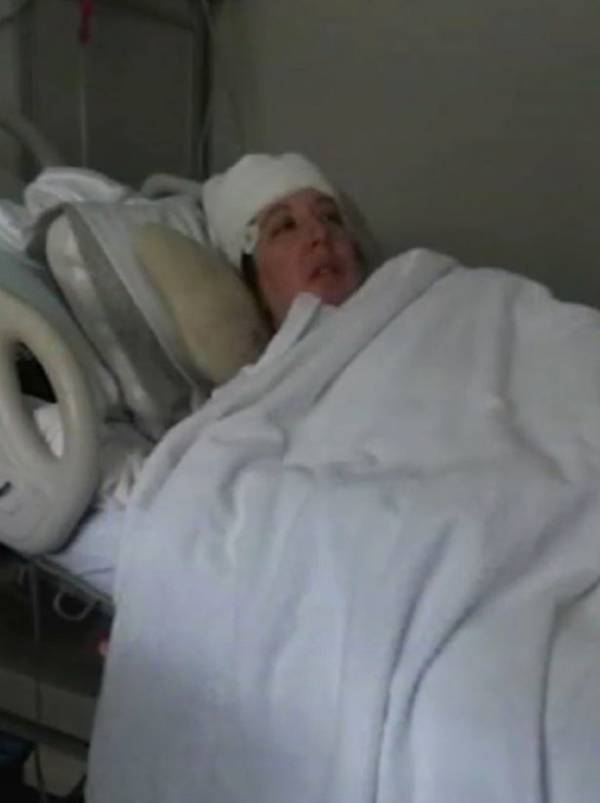The 42-year-old New Yorker was nonetheless relieved to hear that she had a tapeworm instead of a malignant brain tumor.

Mount Sinai Health SystemDoctors were initially convinced that it was a tumor on her left lobe which caused her symptoms. Only once her skull was opened did they find the real culprit.
When Rachel Palma started to forget words and accidentally dropped coffee mugs on the floor, she knew something was terribly wrong. After a doctor’s visit and subsequent MRI scan, it appeared that she had a brain tumor. At least, this is what doctors thought until surgery began — and a tapeworm was discovered slithering around her brain.
According to The Daily Mail, the 42-year-old New Yorker experienced tremors as early as January 2018. Palma visited numerous doctors after having trouble completing full sentences and losing regular coordination.
WCYB News 5 reported that Palma’s symptoms were so bad that she experienced hallucinations, insomnia, and had “horrific nightmares” when she was able to sleep. Her right hand would suddenly stop working.
“My episodes were getting more and more bizarre,” she said. “There were days that I didn’t know where I was.” Initially, doctors could not help Palma even after taking multiple scans of her brain. Only once she saw specialists at Mount Sinai — seven months after the symptoms began — was someone able to help.
Of course, she was misdiagnosed with a malignant brain tumor and it wouldn’t be until Mount Sinai surgeons finally opened her skull during a three-hour operation that they discovered the real culprit.
Rather than a marble-sized tumor on her left lobe as was expected, Dr. Jonathan Rasouli discovered a long, flat, worm leeching off of Palma’s brain. Normally, such a find is cause for concern — but because the initial diagnosis was a fatal brain tumor, a baby tapeworm warranted cause for celebration.
“We were, like, overjoyed,” said Dr. Rasouli, chief resident of neurosurgery at Mount Sinai. “We were, like, cheering and clapping. We were so happy…When we got in there and saw that it was a tapeworm, we were like: “‘YES!’ We were so happy!”

ABCPalma first experienced symptoms in January 2018, but the tapeworm eating her brain wasn’t removed — let alone identified — until September.
While some patients may have been aggravated that a collection of the most professional doctors in the country couldn’t tell a tumor from a tapeworm until being face to face with it, Palma was overjoyed at the end results.
“The good news is, I don’t have cancer,” she said.
Palma was suffering from a condition known as neurocysticercosis, which is actually a leading cause of adult-onset epilepsy across the globe. In the United States, about 1,000 people are hospitalized for the condition each year, with most patients coming from regions like South America. Usually, treatment is as simple as prescribing a course of antibiotics. For Palma, however, this was not the case as the tapeworm had already grown too large.
Tapeworms are most commonly found in the intestines of animals. The most common cause of a tapeworm infection in humans is the consumption of undercooked meat. These slithering little critters can grow up to 80 feet and survive as long as 30 years in a host, according to Mayo Clinic.
Perhaps the most disturbing fact about tapeworms, though, is that they evolved to have numerous retractable hooks which allow them to clamp down onto tissue and hold on to the intestines or organs of their hosts. The parasites don’t have intestines of their own and use their exteriors to absorb nutrients and dispose of waste.

ABC7Tapeworms can grow up to 80 feet and survive in a host for up to 30 years.
Palma still does not know how exactly she was infected with one of these revolting creatures. Of course, it’s not as if she is particularly eager to revisit any of this in detail, either.
“I stopped asking questions and started celebrating and making the most out of life because, in an instant, it can be taken away,” she explained. “I thought ‘gross.’ I didn’t know what to think,” she added. “I was relieved at that point that it wasn’t cancer and that I wouldn’t need any further treatment. I don’t like to speculate how I may have contracted it because I don’t know.”

ABCThe harrowing experience has left Palma with a renewed sense of appreciation for life and an urge to raise awareness about tapeworms.
In the end, Palma believes that she was given a second chance. Besides being happy to be alive, she’s also begun to raise awareness of and support education about tapeworms.
Mainly, the 42-year-old is simply grateful to those who removed that lecherous worm from her skull. “There is no doubt in my mind that (the doctors) saved my life,” she said. “And they gave me my life back.”
Next up, check out these 50 interesting and random facts that will melt your brain and shock your friends. Then, read up on how Lysol was once used as a form of birth control — and poisoned a lot of women.





